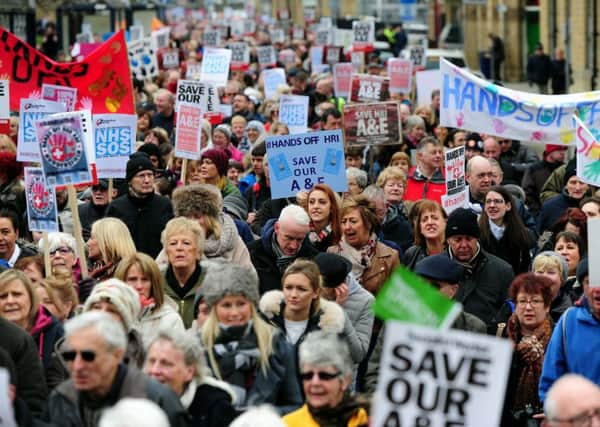YP Comment: A&E: Patients must come first in Huddersfield


Almost buried in one paragraph on community care, he notes that the “current transformation plans” in the area “appear to be plans for organisations rather than for the place of Kirklees” – no doubt a reference to plans to close Huddersfield Royal Infirmary’s A&E unit and force patients to travel to Halifax in the event of an emergency, a tortuous journey at the best of times and even more difficult in inclement weather or when the M62 is blocked.
The more this decision is scrutinised, the greater view that the health needs of patients in Huddersfield, now in danger of becoming the largest town in England to be left without A&E provision, are playing second fiddle to the requirements of NHS after it emerged that the cost of Calderdale Royal Infirmary in Halifax, built for a cost of £64.6m when New Labour came to power, will rise to an exorbitant £773.2m under the terms of Gordon Brown’s ruinous PFI deal.
Advertisement
Hide AdAdvertisement
Hide AdIf two hospitals in relatively close proximity were deemed necessary less than 20 years ago, it is surprising that this is no longer the case when Huddersfield is home to a thriving university and that the Calder Valley is expected to expand if the Northern Powerhouse gets off the ground. Perhaps Health Secretary Jeremy Hunt and his deputy Ben Gummer will consider the Huddersfield quandary from this perspective: If a casualty unit of comparable size was earmarked for closure in either of their constituencies, would they accept the decision? If their answer is in the negative, then they are duty-bound to review this process so patients come before NHS bosses.
A battle of wills: PM and Corbyn’s class warfare
JEREMY Corbyn could afford a moment of self-indulgence when he asked his 100th question to David Cameron at PMQs – many thought that the Labour leader would not last this long. Yet, in doing so, Mr Corbyn highlighted his own weakness because the most pertinent question came shortly afterwards when Leeds MP Richard Burgon asked the Tory leader pithily if he would resign if Britain voted to leave the EU.
Mr Cameron’s one-word answer – “No” – certainly provided a level of clarity that he does not normally afford the Labour leader, and, of course, the Prime Minister’s fate is likely to be secured by his own backbenchers if the increasingly insurgent Leave campaign prevails on June 23.
But what was most dispiriting was the vitriolic nature of the exchanges on the plight of the disabled, and also social mobility, between the Conservative and Labour leaders when both have promised to make this Parliamentary occasion more constructive.
Advertisement
Hide AdAdvertisement
Hide AdAhead of next week’s Budget, which will inevitably become a battle of ideologies between the main parties, it’s just a shame that the two protagonists lost sight of the fact that they were talking about individuals and ways to give young people the best possible start in life. Can Mr Cameron and Mr Corbyn try and remember this if both survive the duration of their next 100 questions and answers?
Pension pitfalls: Time to face up to the future
THAT nearly half of all adults in Yorkshire do not know the value of their pension pot is indicative of two trends – a general acceptance that many of today’s generation will have to work much longer before they can afford to retire, and also the fact that the issue is so convoluted that they simply do not know how to come to terms with the implications for their own finances. Not everyone will be able to rely upon the so-called “bank of Mum and Dad” because of changing demographics.
Yet, the longer people delay the day of reckoning when they have to start putting sufficient money aside for their retirement, the greater the likelihood that they will not be able to lead a comfortable lifestyle in their old age and be in a position to pay for necessities and future care needs. Perhaps Baroness Altmann, the Pensions Minister, is right when she challenged MPs to inject some fun into this very serious subject – the current approach is not working.
This is the key question: Do working-age people want to be like those OAPs who have to decide whether to heat or eat each winter? If they don’t, they need to take responsibility. The Government can’t be expected to do it for them.